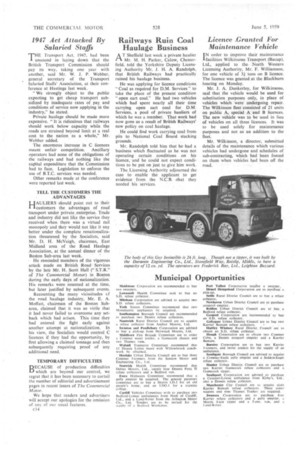1947 Act Attacked By Salaried Staffs
Page 56

If you've noticed an error in this article please click here to report it so we can fix it.
THE Transport Act, 1947, had been unsound in laying down that the British Transport Commission should pay its way, taking one year with another, said Mr. W. I. P. Webber, general secretary of the Transport Salaried Staffs' Association, at their conference at Hastings last week.
"We strongly object to the public expecting to get cheap transport subsidized by inadequate rates of pay, and conditions of service now applying in the industry," he stated.
Private haulage shottld be made more expensive. " It is ridiculous that railways should work below capacity while the roads are strained beyond limit at a real cost to the nation as a whole," Mr. Webber added.
The enormous increase in C licences meant unfair competition. Ancillary operators had none of the obligations of the railways and had nothing like the capital expenditure that the Commission had to face. Legislation to enforce the use of B.T.C. services was needed.
Other remarks made at the conference were reported last week.
TELL THE CUSTOMERS THE ADVANTAGES
UAULIERS should point out to their 1 "customers the advantages of road transport under private.enterprise. Trade and industry did not like the service they received when there was a virtual rail monopoly and they would not like it any better under the complete renationalization threatened by the Socialists, said Mr. D. H. McVeigh, chairman, East Midland area of the Road Haulage AssoCiation, at the annual dinner of the Bogton Sub-area last week.
He reminded members of the vigorous attack made on British Road Services by the late Mr. H. Scott Hall ("S.T.R." of The Commercial Motor) in 'Boston during the early days of nationalization. His remarks were resented at the time, but later justified by subsequent events.
Recounting the many vicissitudes cf the road haulage industry, Mr. E. A. Moffatt, chairman of the Boston Subarea, claimed that it was so virile that it had never failed to overcome any setback which had arisen. This time they had entered the fight early against another attempt at nationalization. In his view, the Socialists would control C licences if they had the opportunity, by first allowing a claimed tonnage and then subsequently requiring proof .of any additional need.
TEMPORARY DIFFICULTIES
BECAUSE of production difficulties which are beyond our control, we regret that it has been necessary to curtail the number of editorial and advertisement pages in recent issues of The Commercial Motor.
We hope that readers and advertisers will accept our apologies for the omission of any, of our usual features.
c14




































































































































